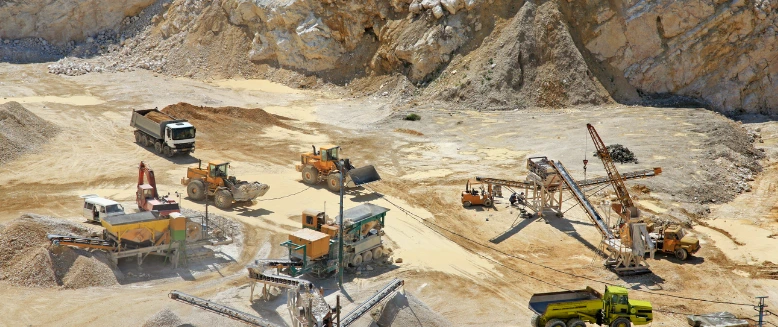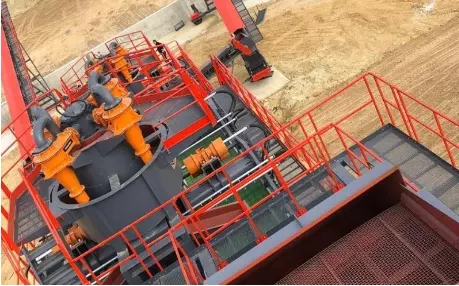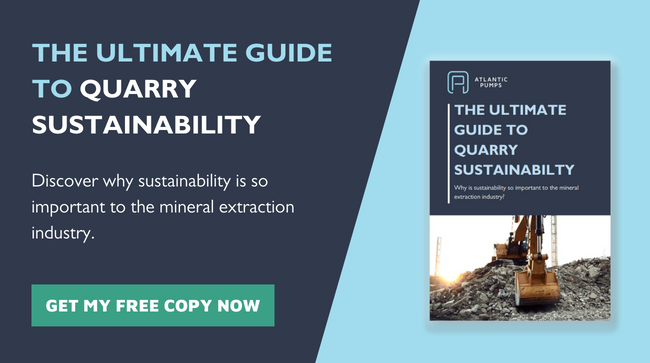Contents
Why Is Sustainability So Important To The Mineral Extraction Industry?
Do You Really Need A Pump That Big?
Moving Quarries Onto Renewable Energy
Can A Quarry Make A Good Neighbour?
Sustainability is vital to the mineral extraction industry for many reasons, but how can you make your site more sustainable? Find out everything you need to know below...
Why Is Sustainability So Important To The Mineral Extraction Industry?
In every industry, sustainability is becoming of increasing urgency as we begin to feel the effects of damaging industrial practices of the last two centuries. Certainly, the quarry industry has come a long way since the times of slag heaps and sending indiscriminate waste to landfill, but the drop in CO2 emissions flattened in 2015 so we cannot afford to rest in our pursuit of full sustainability in the quarrying and aggregate industry.
Building on this philosophy of careful resource management, responsible site operators are forever looking for new ways to continually improve sustainability in their activities and work towards net zero.
Considering the big impact that quarrying, being a primary industry, can potentially have on the local and global environment – for good or bad - environmental sustainability is a key factor of long term success. There is no time to lose.
Sustainability means meeting today’s demand without compromising the value of resources for future use. Quarry operators need to take good care of their environmental, social, and governance responsibilities for the business to remain sustainable into the future.
Renewable practices work for the long-term success of all involved; shareholders, customers, local quarry communities, and future site users. Through environmental planning controls over the past decades, we now have former quarry pits that are enriched havens for wildlife and recreation today.
In more recent years, leading aggregate and construction material companies have begun including Biodiversity & Sustainability Indicators into their management targets. The Building Research Establishment (BRE) has developed a Sustainability Certification scheme, BES 6001, for the building materials industry. The Supply Chain part of BES 6001 will be of particular interest to all primary aggregate suppliers, even those who don't need the full third-party certificate as it explains what leading buyers are looking for when sourcing.
Quarry sites, land, and minerals are finite resources. Considerate extraction, recycling, and remediation activities are vital in making a positive impact on our natural capital and avoiding financial, environmental, and reputational damage.
Putting the environment high up on the agenda works financially. According to Fidelity International’s research, studies show that sustainable companies have higher levels of dividend growth; at over 5% in the past five years. Simply “greenwashing” backfires – a concrete plan, practical steps and environmentally informed, feasible decisions increase the sustainability and resilience of your company’s operations. Environmentally conscious companies can generate significant financial savings; 71% of sustainable quarries reported a decrease in their overall running costs. This makes sense when you look at the cost of wasted energy, potential fines, overly powered/inefficient plant, planning permission refusals, and Environment Agency issues etc that unsustainable practices encounter.

Decarbonisation For Quarries
As mining requires a large amount of energy use, with its associated increasing price tag and carbon emissions concerns, energy management will be a priority focus of quarry operations over the next few years. Decisions on plant and machinery need to be well thought out and backed-up by research and reliable standards. The externally audited ISO 14001 standard is a rating which demonstrates commitment to reduced carbon emissions by design. As a quarry manager you might want to consider if implementing this standard formally for your own business is worth the extra admin time, but in any case, it is something to look out for when choosing suppliers and partners to work with.
Atlantic Pumps is a certified ISO 14001 quarry pump consultant and has a track record of reducing energy usage of site pumping, with savings of up to 20% on fuel use achieved for our clients. By specifying efficient pump solutions that are made for quarrying and mining environments, both your business and the planet benefit from reliable and effective equipment.
Electric vs. Diesel Pumps
Choosing the correct equipment at your quarry is probably the most frequent opportunity you get to make your business continually more sustainable.
One of the biggest decisions faced by quarry managers is whether to opt for electric or diesel ancillary equipment such as pumps.
With the expansion of clean electricity production, the balance is tipping towards financial incentives to move away from diesel powered equipment to electric. A big challenge for large quarry sites with the need for mobile plant, this is an area that Atlantic Pumps can advise on as it is vital for enabling the industry to meet net-zero. Electric pumps are almost certainly the better option over diesel powered now, from the environmental point of view , and increasingly so from the financial sustainability side.
Below are just a few benefits of an electric pump vs. diesel:
- It is usually far cheaper to run an electric pump than a diesel pump.
- Electric pumps require less maintenance.
- Zero diesel emissions from electric pumps.
- Electric pumps carry no risk of environmentally contaminating fuel spillages.
- Industrial sources of renewable electricity supplies are growing.
Is a full switch to electricity is not yet feasible for your remote quarry site? As a step in the right direction, a wise decision could be to buy electric equipment when upgrading or replacing it, even if you need to run it on a generator for now. This better equips you for future sustainability improvements in electricity generation, as it becomes ever-more practical and cost-effective. This will also avoid all too frequent purchases of outdated machinery which is likely to end up with little residual value. Modern electric pumps now have more efficiency/lower running costs than the diesel ones they replace – even when a generator has to be used in certain instances. The cost of running cable to remotely sited equipment is becoming comparatively more reasonable now that oil fuels are being priced out of the market.

Do You Really Need A Pump That Big?
When conducting quarry site audits, engineers from Atlantic Pumps often found overly large pumps that had been mis-sold, resulting in excessive fuel use for the task at hand. Selecting the correct pump means considering several factors; it needs to be robust to cope with the fluid or slurry nature, working environment, and volume/distance requirements whilst not wasting energy.
Talking of pumps, did you know 85% of the total lifetime cost (including purchase price, installation, and disposal) of a pump is spent on running costs alone? It’s worth taking the time to make the correct decision on equipment model and capacity size. Do your research and never hesitate to consider bringing in a knowledgeable third-party advisor if you are looking for any specialist equipment. In any case, spell out your needs to potential suppliers and see what they advise on hearing your requirements; after all, they should know their products inside-out and be able to provide suitable reassurances.
Moving Quarries Onto Renewable Energy
With such a global push on sustainability, new ways for quarries to further reduce their carbon footprint are needed. This globalised effort, along with government incentives are leading to more reliable and cost effective clean energy innovations, and will only improve over time. Equipment buyers need to ensure their decisions support today’s operations whilst being future-ready. Many sites are looking towards onsite electricity generation options such as wind and solar for their electrical supply needs.
UK quarries are also choosing to source renewably sourced electricity from utility companies committed to clean energy such as Bulb, Octopus, Shell Energy, and others. Using electricity rather than diesel wherever possible; such as for pumps, dust suppression and other ancillary equipment can reap dividends in financial and environmental benefit.
Quarries across the UK and Europe are eager to incorporate hydrogen power as soon as it becomes widely available. Atlantic Pumps are following various leaders such as JCB, and hydrogen specialists Ceres Power, ITM, and Johnson Matthey who are making strides in its development. Hydrogen power provides an inherently clean form of energy that causes zero environmental impact and is unaffected by the availability of sunlight or wind, but it will be some time before it is viable for wide-scale industry. The UK government aims to have commercially viable hydrogen power supplies by 2030, with hydrogen making up to 35% of energy use nationwide by 2050. It will be interesting to see what technology will be of particular use to remote sites, such as quarrying and mining for instance, the island of Orkney is trialling what hydrogen power can do for localised and remote regional energy management.

Can A Quarry Make A Good Neighbour?
When considering the environmental impact of quarries, we must look carefully at how our activities affect local communities. Quarries that do not embrace sustainability are likely to have adverse effects on the surrounding community – people and wider nature. Pollution and dumping of excess materials are a no-go and steps should be taken (and recorded) to ensure communities feel as little impact on them as possible. Noise, dust, material handling, and water runoff are the major factors that quarries need to control.
Noise: if noise cannot be adequately prevented (e.g., electrically-powered equipment is quieter than conventional fuels), then mitigation measures such as sound barriers should be considered.
Options for Dust Suppression are spraying water onto the material before the dust is stirred up, which is best for protecting site staff working in that zone, or a water mist into the dust cloud, as near to the source as possible. Quarrying sites are often restored to a more nature friendly state than before the quarrying started; in fact, many become nature reserves or public recreation sites.
Reusing Water And Materials
Look at ways to avoid excess wastewater exiting your quarry, by recycling it for use elsewhere on-site. A “closed-loop” water system is the ultimate quarry water management approach, especially where water hungry processes are involved such as wash-plants. Not only is fresh water conserved but any water that needs to be discharged can be safely cleaned to be environmentally sound. Compact and versatile pumps designed for quarry water, such as the Audex submersible and small Varisco centrifugal pumps are very handy and economical to run. Contaminated water can be treated in settlement and correction tanks such as used in the EnviroHub system.
When de-watering of quarries is necessary, the environmental considerations are centred on energy use and impact on surrounding waterways when water discharge activities are undertaken. In the UK, the Environment Agency (EA) authorises, monitors, and enforces a strict policy of natural water usage and discharge of wastewater, and this is an area of increasing public interest. Water filtration or other treatments can be built in so that any quarry water can be made suitable for anything from factory usage (e.g., cement manufacture), to wheel and equipment washdowns, and even up to the purity required for release under license from the EA. EnviroHub is a system that monitors, records, reports, and treats site water to provide environmental security and peace-of-mind compliance. It can even be programmed to operate valves or pumps depending on pumps based on water-quality.
Waste or by-product material? There is a market for nearly every quarry product, once separated via a washplant. This not only has ecological benefits in avoiding landfill but has obvious economic gains too in increasing the gap between costs and sales. The more finely graded the output aggregate, generally, the best price (or ease of responsible disposal) is obtained.
Recycling of demolition materials back into usable aggregates on the secondary market is increasingly becoming an important part of the UK quarrying industry’s positive contribution to a greener and more sustainable future.

Other Areas Of Sustainability For Quarries
No consideration of sustainability can be complete without focusing on the responsibility to nurture your people and workforce. The UK quarry and mining industry is rightly proud of its safety and social care record. The continued creation of meaningful, rewarding careers in the quarry and mining industry, where staff are developed, challenged, and rewarded is key to a brighter future. Investment in training and modern equipment leads to safer, higher-paid jobs and vibrant communities.
Atlantic Pumps seek to set an example as leaders in quarry and mining pump solutions. Investment in the personal development of staff ranges from the provision of University apprenticeships for those starting out in the industry to continuous professional training of their qualified engineers.
Sustainable Quarrying is literally the bedrock of the UK’s sustainable growth plans, replacing dependence on imported and long-haul aggregates with short-chain and circular supply lines, enabling the construction of energy-saving homes and infrastructure and providing some £20 billion of gross value added (GVA) to the UK economy.
As an industry, we can show that mining and nature are here to not only co-exist, but to help each other flourish into the future. To quote the Joint Nature Conservation Committee, "we need to go high nature and low carbon" now to secure our future. Given the chance, nature is a powerful ally in mitigating the effects of climate change. Take just one example, the Beaver. Various trials in the UK are showing that when the water quality is protected, the experts in flooding and drought prevention can set to work. A former gravel quarry at Willington Wetlands Nature Reserve is one such example of quarrying providing for nature.
Sustainability is such a big topic that it is easy to feel overwhelmed. If this is where you’re at, then start with one or two action points that you can achieve in the next 3-6 months and share these with key members of your team. If you’ve found this Guide helpful, why not share it with them too?
The next steps to be taken with Atlantic Pumps
There is no denying that sustainability is the future of the UK quarrying industry. Our goal at Atlantic Pumps is to help every quarry in the country move towards a more environmentally-friendly way of working and operating. Talk to one of our experts today to discuss how our sustainable pumps can help to reduce your quarry's carbon footprint. We offer tailored consultations for clients from all sectors of the mining and quarrying industry. Our experts are on hand to advise and provide strategies to meet your exact requirements. Let us help you take a greener step forward.

